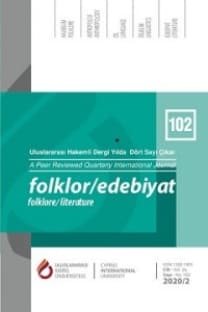Antropolog Lloyd A. Fallers’ın 1960’lardaki Türkiye Çalışmaları
antropoloji tarihi, Lloyd A. Fallers, soğuk savaş, siyasal hayat, kasaba
Anthropologist Lloyd A. Fallers’ Research in Turkey during the 1960s
history of anthropology, Lloyd A.Fallers, cold war, politikal life, town,
___
- El-Zein, A. H. (1974). The sacred meadows: a structural analysis of religious symbolism in an east African town. Northwestern University.
- Fallers, L. A. (1967). The meaning and end of religion: a new approach to the religious traditions of mankind. American Anthropologist, 69 (1), 120-121.
- Fallers, L. A. (2017). The social anthropology of the nation-state. Routledge.
- Flowers, R. B. (1984). Religion in strange times: the 1960s and 1970s. Mercer University.
- Gilman, N. (2003). Mandarins of the future: modernization theory in cold war America. The Johns Hopkins University.
- Handler, R. (1991). An Interview with Clifford Geertz. Current Anthropology, 32 (5), 603-613.
- Lewis, B. (1952). Islamic revival in Turkey. International Affairs, 28 (1), 38-48.
- Lewis, H. S. (2018). Anthropology’s Camelot myth—and what we can learn from it. R. Darnell ve F. W. Gleach (Ed.), Tracking anthropological engagements içinde (213-228). University of Nebraska.
- Reed, H. A. (1954). Revival of Islam in secular Turkey. Middle East Journal, 8 (3), 267-282.
- Robbins, J. (2006). Anthropology and theology: an awkward relationship? Anthropological Quarterly, 79 (2), 285-294.
- Sahlins, M. (2009). The teach-ins: anti-war protest in the old stoned Age. Anthropology Today, 25 (1), 3-5.
- Sipahi, A. (2021). In pursuit of intellectual discovery: an interview with Michael E. Meeker. New Perspectives on Turkey, 65, 100-119.
- Sipahi, A. (2022). Peter Benedict: Türkiye etnografi tarihinden bir portre. Antropoloji, 44, 4-19. https://doi.org/10.33613/antropolojidergisi.1081152
- Stirling, P. (1958). Religious change in Republican Turkey. Middle East Journal, 12 (4), 395-408. Turan, Ö. (Ed.). (2019). 1968: İsyan, devrim, özgürlük. Tarih Vakfı.
- Warner, B. (2011). Dialogical history and the history of a dialogue: three visions of the Committee for the Comparative Study of New Nations at the University of Chicago. https://bijanwarner. files.wordpress.com/2016/05/warner_ccsnn_may21_2011.pdf
- ISSN: 1300-7491
- Yayın Aralığı: 4
- Başlangıç: 1994
- Yayıncı: -
Kırgız Anlatılarında Kadının Evriliş Süreci
Mayramgül DIYKANBAY, Reyhan KARKINLI
Antropolog Lloyd A. Fallers’ın 1960’lardaki Türkiye Çalışmaları
Safiye Erol’un Romanlarında Yeme-İçme Kültürü ve Alışkanlıkları
Antalya’da Definecilik ve Define Folkloru Üzerine
İhsan Oktay Anar’ın Efrâsiyâb’ın Hikâyeleri’nde Mit/Metafizik Gülünçlemesi ve Yabancılaştırma Etkisi
Ahmet Gazioğlu ve Andreas Onoufriou’nun Romanlarında “Öteki”İmajları: Kıbrıs, Milliyetçilik ve Savaş
Arzu ve Zevk Arasındaki İmkânsız Mekân: Mevlâna ve Lacan’da Karşılaştırmalı Bir Aşk İncelemesi
Ghiasuddin ALİZADEH, Masoud FARAHMANDFAR, Mousa RAHİMİ
Renan Demirkan’ın Üç Şekerli Demli Çay Romanında Türk ve Alman Kültürü Yansımaları
Rus Dilbilim Ekolünde Söylem ve Metin
Kültür Turizminin Geleneksel Kıbrıs Türk El Sanatlarının Sürdürülebilirliği Üzerine Bir Araştırma
